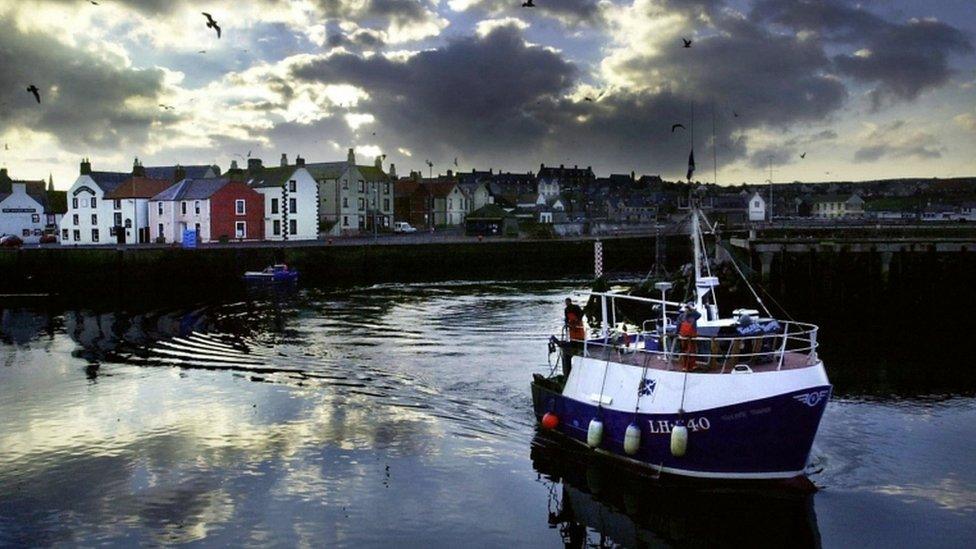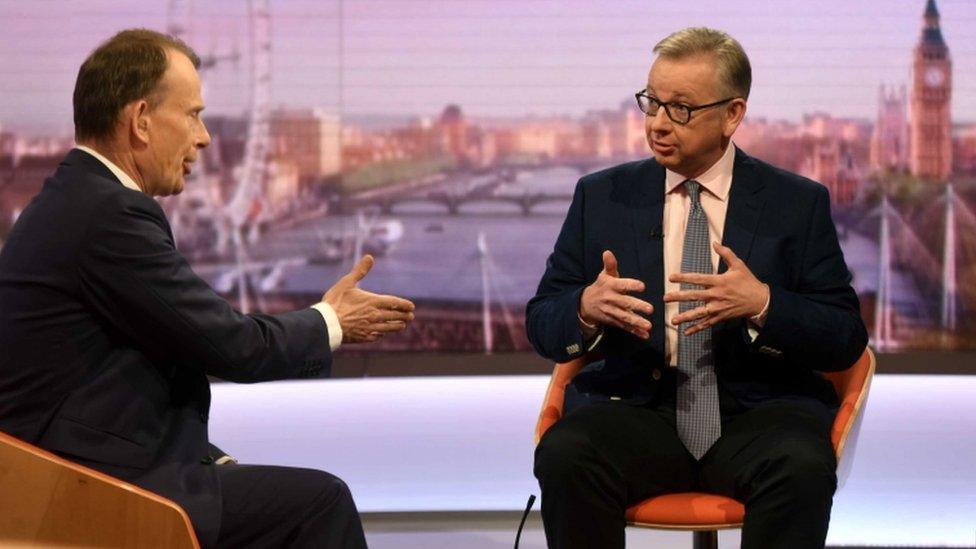Brexit: Gove confirms foreign access to UK fishing grounds
- Published
- comments

Scottish fishermen are largely supportive of Brexit
Michael Gove has confirmed that some foreign trawlers will still have access to UK waters after Brexit.
Mr Gove, the UK environment secretary, said British fishermen would not have the capacity to land all of the fish in British territorial waters.
And he said that some access would therefore be granted to vessels from other countries.
He was speaking during a fact-finding mission to Denmark, which was largely focused on the Danish food industry.
The Danish fishing industry is currently highly-dependent on fish caught in UK territorial waters.
'Being realistic'
The meeting was attended by Niels Wichmann, chief executive of the Danish Fishermen organisation, who told BBC Scotland that there was no suggestion from Mr Gove that Denmark would receive preferential treatment.
And he said Mr Gove "did not say numerous countries, he just said other countries" would be granted access.
Mr Wichmann added: "The thing is he was just being realistic and he was saying that we need, within the Brexit negotiations phase, to find out where the final goal is, the final solution to the fisheries.
"The fisheries will be outside the common fisheries policy and we need a transitional period. In that transitional period we will have to have access from other countries."

Mr Gove told the BBC's Andrew Marr last month that no foreign fishing would be allowed within six to 12 miles of the UK coast after Brexit
Mr Wichmann also said that the Danes were seeking a deal that would effectively mean "business as usual" with regard to access to UK fisheries after Brexit.
Mr Gove's remarks in Denmark follow an appearance on the BBC's Andrew Marr show last month, when he said no foreign boats would be allowed to fish within six to 12 miles of the UK coast.
But he said the UK would become an "independent coastal state" after leaving the EU, which would allow it to extend control of its waters up to 200 miles from its coastline.
Mr Gove said this would allow the UK to "take control" of its waters, and then negotiate with other countries to allow them access to British fisheries.
He also described the EU's common fisheries policy as an environmental disaster, and said the government wanted to change that, upon Brexit, to ensure sustainable fish stocks in future.
The common fisheries policy has been extremely unpopular among Scottish fishermen, who are said to have overwhelmingly backed Brexit.
Anger has generally been focused on quotas for fishing catches and on other European fleets being given equal access to fishing grounds in Scottish waters.
'First call'
Responding to Mr Gove's remarks, Bertie Armstrong of the Scottish Fishermen's Federation said: "It is clear from our meetings with the government that control over our waters will be in our hands after Brexit.
"We will be out of the Common Fisheries Policy and we will decide who fishes where and for what. Our position is straightforward: we must have first call on quota."
But the SNP claimed that the "startling revelations on the Tories' true position over fisheries post-Brexit" showed that "you cannot trust the Tories to stand up for rural Scotland's interests".
SNP MSP Stewart Stevenson said: "Michael Gove must immediately make absolutely clear what the UK government's real position on the future of fisheries is.
"He could start by confirming that devolved powers over fisheries will transfer to Scotland so that we can get on with developing our own management policies which put Scottish fishing interests, offshore and onshore, first."
A spokesman for the UK's Department of Environment, Food and Rural Affairs said: "Leaving the EU means we will take back control of our territorial waters, and for the first time in 50 years we will be able to grant fishing access for other countries on our terms.
"We will allocate quotas on the basis of what is scientifically sustainable, making sure we have a healthy marine environment and profitable fishing industry."